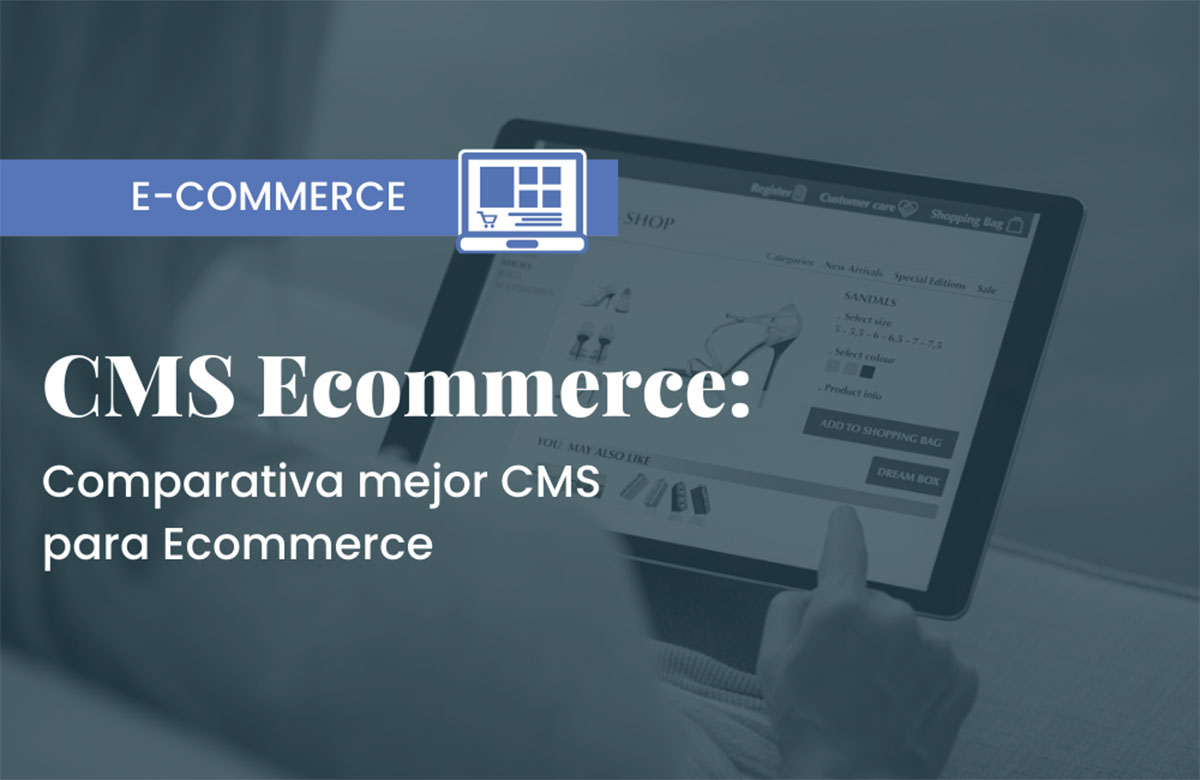What is the best CMS for ecommerce?
There are many different types of content management systems, and as expected, each offers a unique set of features and benefits. But what if you are looking for a CMS for ecommerce specifically tailored to your type of store and with beneficial tools?
Well, you’re in luck! In this article, we will review the best CMS platforms for online stores. We will talk about what they are, what they do, and highlight some of the best on the current market.
[poll id=”25″]What is the best CMS for ecommerce in 2022?
There is no single answer to this question, as the best CMS for ecommerce depends on a variety of factors, including the size and scope of your business, your budget, and your technical experience. However, in general, we believe the three best ecommerce CMS solutions on the market today are Magento, Shopify, and WooCommerce.
Magento – The Most Versatile Ecommerce CMS
It is a popular open-source ecommerce platform used by some of the world’s largest brands, including Nike, Samsung, and Ford. Magento is a highly customizable platform offering a wide range of features and plugins to help you build a successful online store.
However, Magento can be a bit challenging to use if you are not technically skilled, as it requires a good amount of coding knowledge to set up and customize your store.
Magento’s intuitive admin interface makes managing your online store easier, while its powerful shopping cart functionality allows you to offer your customers a smooth and convenient shopping experience.
Magento’s powerful marketing tools, SEO optimization, and catalog management allow you to create a unique online store that stands out from the competition. With Magento’s flexible pricing options, you can offer your customers competitive prices.
Advantages
- Magento is an open-source ecommerce platform offering a high degree of flexibility and customization.
- Magento comes with a rich set of out-of-the-box features, including support for multiple languages and currencies, product categories, shipping methods, and payment gateways.
- Magento’s modular architecture makes it easy to extend the platform’s functionality with custom modules and plugins.
- The well-documented API of Magento allows easy integration with third-party applications and services.
- The Enterprise edition of Magento offers advanced features and functionalities for larger businesses, including customer segmentation, gift cards, store credits, and reward points.
Disadvantages
- It can be complex to use and configure, especially for those without technical knowledge.
- The learning curve can make developing custom modules and plugins time-consuming and costly.
- Performance may be affected when handling large catalogs or high traffic volumes.
- Significant server investment is required, especially if running multiple stores on one installation.
- The Enterprise edition can be very expensive, starting at over €14,000 per year.

Shopify – The Easiest Ecommerce CMS to Use
It is the leading ecommerce CMS used by businesses of all sizes, from small companies to enterprise-level corporations. Shopify is extremely easy to use and offers a wide range of features and plugins to help you build a successful online store.
One of Shopify’s main advantages is that it offers a 14-day free trial, so you can try the platform before committing to a monthly plan.
Shopify is a leading ecommerce platform that allows businesses of all sizes to create an online store. Shopify provides a simple yet powerful solution for selling online, in-store, and on the go.
Shopify offers a wide range of features and integrations that businesses can use to create a seamless and unique shopping experience for their customers.
With Shopify, businesses can easily create a beautiful, professional online store that is fully customizable to their brand and products. Shopify also provides a robust point-of-sale solution that allows businesses to sell in-store and on the go.
Advantages
- Shopify is a hosted platform, meaning you don’t have to worry about hosting your store or managing server fees.
- Shopify offers a wide range of features and integrations that allow you to tailor your store to your business needs.
- Shopify has a very user-friendly interface, making it easy to get started even if you are not tech-savvy.
- Shopify offers 24/7 customer support, which can be very helpful if you are just starting and need assistance setting up your store.
Disadvantages
- Shopify transaction fees can be quite high, especially if you sell low-priced items.
- Shopify themes can be expensive, and finding a good-quality one can be challenging.
- Shopify can be a bit overwhelming if you try to do everything yourself. It’s often worth investing in external help, like a course, a book, or hiring a Shopify expert.
WooCommerce – The Best Ecommerce CMS for WordPress
It is a popular WordPress plugin that turns your WordPress site into a full-fledged ecommerce store. WooCommerce is a highly customizable platform offering a wide range of features and plugins to help you build a successful online store. However, WooCommerce can be a bit difficult to use if you are not technically skilled, as it requires coding knowledge to set up and customize your store.
WooCommerce is a free ecommerce plugin that allows you to sell products and services online. WooCommerce is popular for many online businesses because it is easy to use and offers plenty of customization options.
WooCommerce is a great way to start selling online and can be used to sell physical or digital products. WooCommerce is a flexible platform that can be customized to fit your business needs.
Advantages
- WooCommerce is a free plugin for WordPress.
- Setting up a WooCommerce store is quick and simple.
- There are many extensions and plugins available for WooCommerce.
- WooCommerce is a very flexible platform.
- WooCommerce has excellent documentation.
Disadvantages
- WooCommerce can be slow.
- WooCommerce can be difficult to customize.
- WooCommerce has a learning curve.

What is an ecommerce CMS?
An ecommerce CMS is a content management system specifically designed to create and manage online stores. In other words, it is a platform that helps you build an online store and then manage all your store content (products, orders, customers, etc.) from a central location.
There are many different ecommerce CMS platforms, but they all share some common traits:
- All of them facilitate the creation and management of an online store.
- All of them provide a way to manage your store content from a central location.
But that’s not all an ecommerce CMS can do. In addition to helping you create and manage your store, an ecommerce CMS can also help you market your store and sell products online.
Some of the most popular ecommerce CMS platforms today include Shopify, BigCommerce, WooCommerce, and Magento.
What does an ecommerce CMS do?
An ecommerce CMS provides everything you need to build and manage an online store. In other words, it is a complete platform to create and manage an online store.
Here’s a quick summary of some things an ecommerce CMS can do:
- Create an online store.
- Manage your store content.
- Market your store.
- Sell products online.
- Track your store’s performance.
- Grow the store.
- Scale your store.
- Optimize your store.
- Troubleshoot store issues.
How to choose the best CMS for ecommerce
There are a large number of ecommerce CMS platforms on the market. So, how do you choose the right one for your business?
Here are some things to consider when choosing the best ecommerce CMS:
Budget
How much are you willing to spend on an ecommerce CMS? This is important because the price of an ecommerce CMS can vary greatly.
Technical knowledge
What technical knowledge do you have? If you don’t have much, you’ll want to choose an ecommerce CMS that is easy to use.
Business needs
What does your business need? Make a list of your business needs and then find an ecommerce CMS that meets them.
Experience
Do you have any experience with ecommerce CMS platforms? If so, that will likely influence your decision.
Company size
What size is your company? If you have a small business, you may not need all the features a larger ecommerce CMS offers.
Store size
How big is your store? If you have a small store, you may not need all the features of a larger ecommerce CMS.
Products
What type of products do you sell? If you sell physical products, you’ll need a CMS that can manage inventory. If you sell digital products, you’ll need a CMS that can deliver those products.
Customers
Who are your customers? If you have a global customer base, you’ll need a CMS that can handle multiple languages and currencies.
Web hosting
Where will you host your store? If unsure, choose an ecommerce CMS that provides hosting.
Timeline
When do you need an ecommerce CMS? If you need one immediately, choose a platform that is easy to set up. If you have more time, you can choose a platform that offers more features.
Dos Setenta is an ecommerce agency specializing in consulting for online stores. We can help you choose the best ecommerce CMS that fits your needs. Our marketing agency can also help grow your business through our multidisciplinary services. Don’t hesitate to contact us.



